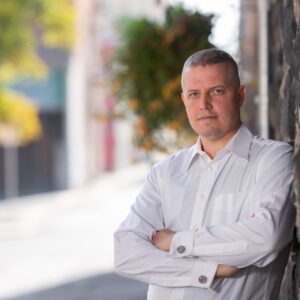“Two phrases that make me sick to my stomach.”
By Zack Barrett 2 AUG 2020
When the media shows up to the scene of a disaster they rush over to the crying victim and start questioning them about what happened. This video will be aired over and over in the next few days. Nothing makes good news like someone emotionally responding to the worst day of their life. Instead of giving space to grieve, we record it for the rest of humanity to join in on this feast of emotion. We make it into a YouTube clip and share it on Facebook. The video goes viral and we click share.
The person in all their pain has no idea what to say. They don’t have a script or a teleprompter. Their head is spinning trying to process what just happened to them and they will eventually let slip one of the two phrases that make me sick to my stomach.
“I never thought it would happen to me.”
It seems like such a natural thing to add when you are the victim of any crime, tragedy, or unexpected destruction. Most of us ignore the sad sentence and move on to absorb the rest of the drama that smoothers the story of a person who never thought. This person never stopped to think that a crime could happen to them. This person never thought about what kind of tragedy could happen to them. This person assumed that disasters only happen in other cities, to other people?
I can’t blame them for not wanting to think about these dire questions. It’s hard to face that scary truth that we are all susceptible to lose, that we all could be the person who says “I never thought it would happen to me”.
In the last 10 years of teaching preparedness, I have tried to convince people that disasters are real and can really happen to you. I never want any of my students to say “I never thought it would happen to me.” So I always try to explain the real threat that all disasters can be. Not to scare anyone but to help them perceive the real threats that exist. I try to explain that we shouldn’t fear disaster but accept that any of a myriad of possible disasters could force us to act and that we can actually have a plan for what to do in those situations. I walk a fine line between not downplaying the disasters and not fear-mongering. Even though I give a masterful argument I always hear the same sentence in reply. It’s that second sentence that makes me sick to my stomach and it’s funny because they all say it word for word and they even say it with the identical inflection.
“Well… that will never happen to me.”
At first, I felt like I had failed as an instructor because I couldn’t even get across the simple message that disasters happen. Their minds reject the possibility and they react verbally, sometimes in the middle of my preparedness classes, sometimes without being asked.
“That will never happen to me….” They blurt out. That sick feeling sinks in realizing that this is the same person who will say, “I thought it would never happen to me!”
I can sell the need for preparedness by scaring you with true disaster stories. Fear is a great marketing tool and could really make people want to change. But I can’t make anyone put in the mental and physical effort to actually prepare for anything. They have to want to be prepared. They have to be willing to accept the risks that are inherent in being a living human in a world filled with dangerous and useful elements. They have to see that most of the time we can use the elements of this world to improve our lives, but at times those elements will work against us and can even overwhelm or destroy us.
Once you accept that you are not in control. You accept that we will all experience loss. We will all be surprised by both good and bad circumstances. We let go of what we think will help us and we shift our focus to those things that matter most. We start pouring our time and effort into the things that we can change.
This is the way to be prepared for all.
Zack Barrett



